Enjoying Exercise After an Injury

Did you know that getting regular physical activity is one of the most important things you can do for your overall health? Whether you are young or old, male or female, already in shape or wishing to be fit, getting regular exercise will help you feel better, have more energy, and add years to your life.
It can be overwhelming to make a commitment to regular physical activity but the benefits are not as far away as you might think. Participating in a moderate-intensity aerobic activity for even 150 minutes (2 hours and 30 minutes) per week is enough for your body to start reaping the rewards. Better yet, the benefits of physical activity far outweigh the risk of getting hurt.
Things to Consider Prior to Changing Your Routine
Speak with your doctor: The most important part about starting a new or first time exercise program is to first speak with your doctor. This is especially important if you have any sort chronic health condition. Conditions such as heart disease, arthritis and diabetes can all affect the type of activity that is best suited.
Start slowly: Going too hard, too fast, is an easy way to cause yourself the types of aches and pains that lead to discouragement. The benefits will be quickly evident even if you take your time ramping up the intensity of your physical activity.
Benefits of Regular Activity
1. Regular exercise controls weight:
Your body gains weight when the calories you burn are less than the calories that you eat or drink. Your body needs to eat and drink to maintain basic daily function. The harder your body is working, the more calories it is burning.
2. Regular exercise reduces risk of certain health conditions and diseases:
Regular physical activity reduces your risk of heart disease, stroke, type 2 diabetes, and metabolic syndrome. Physical activity has also been found to lower the risk of colon, endometrial, and lung cancers as well as the risk of breast cancer for women.
3. Regular exercise strengthens bones & muscles:
Research has shown that regular physical activity can slow the age-related loss of bone density. Building strong bones and muscles has also been shown to be a good way to combat arthritis, lessen your chance of falling, improve your ability to manage pain, and to generally improve your overall quality of life.
4. Regular exercise improves both mood and energy levels:
Physical activity is a good way to blow off unwanted stress to find happiness. Exercise increases concentrations of norepinephrine which moderates the brain’s response to anxiety and stress. Exercise delivers oxygen and nutrients throughout the body allowing it to work more efficiently and save energy for more exciting tasks. Exercise also causes the body to release endorphins which create feelings of happiness. As an added bonus, physical activity can help boost self-confidence and esteem. Exercise has been found to enhance arousal for women while reducing incidences of erectile dysfunction in men.
5. Regular exercise slows cognitive decline:
Regular aerobic activity has been found to create new brain cells and improve overall brain performance. Exercise helps boosts the brains ability to make decisions, participate in higher thinking, while also improving its ability to learn and remember.
6. Exercise for fun!
It will be easier to get regular exercise if you are doing something that is fun and social. Studies have shown that exercising in a group setting, especially for adults 65 and older, helps develop better exercise habits while improving depression, self-efficacy, and dietary habits.
Exercising regularly for up to 150 minutes per week at a moderate pace (or 75 minutes at a vigorous pace) is an easy way to improve your quality of life. Make this summer your time to go for a walk, hike, swim or bike ride. Maybe even join a team. Find something enjoyable where you have the chance to enjoy the outdoors in a place, and/or with a group of people, that make you happy. Your body will thank you for it.
